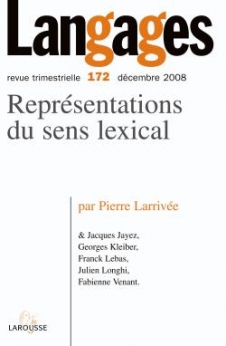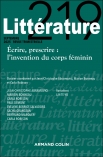
Langages n° 172 (4/2008)
Pour acheter ce numéro, contactez-nous
Recevez les numéros de l'année en cours et accédez à l'intégralité des articles en ligne.
On admet couramment qu'un nom comme livre a plusieurs «facettes» de sens, par exemple qu’il peut évoquer à la fois un objet matériel et un objet qui contient de l’information, sans qu’il y ait antagonisme ou tension entre les deux (Cruse 1995, 1999, 2003). Selon Cruse, les facettes sont distinctes de ce qu’il appelle des « micro-sens » (Cruse 1999, 2003), comme par exemple les différents sens de knife(ustensile de cuisine, arme, outil de jardin). Les facettes se prêtent à des coordinations sans effet de zeugma, comme dans Ce livre est très gros (objet matériel) mais peu intéressant (contenu). L’importance des facettes est admise en sémantique lexicale, mais leur fonction dans la production et la compréhension des expressions est loin d’être claire. Dans cet article, je ne proposerai pas une solution générale à ce problème, mais une illustration limitée du rôle que jouent ou ne jouent pas les facettes. Pour ce faire, j’examinerai deux cas très dissemblables. Le premier concerne la quantification, le second la composition sémantique. Ces deux thèmes sont exemplifiés par deux problèmes bien connus dans la littérature.
A number of works in lexical semantics have emphasised the importance of what Cruse called « facets ». Facets are elements of meaning that refer to subclasses of properties along different dimensions, such as the physical properties of a book as well as its informational properties. Facets have been considered to be crucially involved in quantification and predication, as in Mary read all the books that preferably refers to informational properties as does Mary began to read the book. In this paper, I suggest that the importance of facets has been overestimated. Concerning quantification, I show that the informational facet restriction is a particular case of an overall mechanism of individuation, which reflects general constraints on the distinction of entities. Concerning the French verb commencer (‘to begin’), its distribution depends more on the type of the accommodated predicate than on the meaning of the nominal complement taken in isolation. Although facets play a significant role in interpretation, their function seems to derive from a complex array of constraints, not from intrinsic properties.

